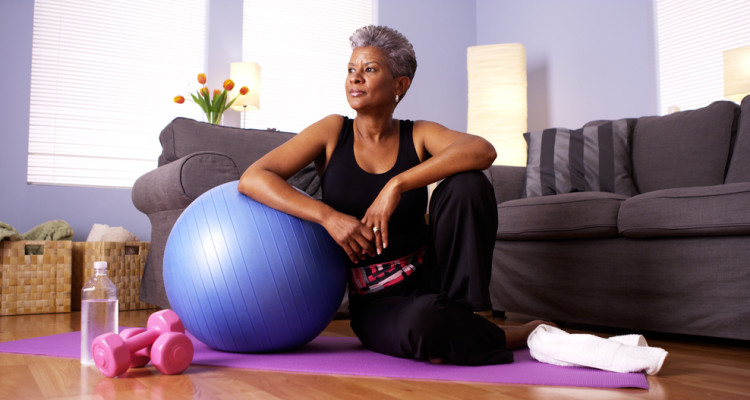When I was younger, I thought 40 was old; like Crypt Keeper-old. But now that I am older and wiser, I realize that 40, 50, and now 60 years old are a far cry from old age. And according to a recent survey by InsideTracker, a personalized health analytics company founded by leading scientists, physicians, nutritionists, and exercise physiologists from MIT, Harvard, and Tufts University, I am not alone in my newfound attitude toward aging in America.
“Our America’s Attitudes to Aging study shows people are taking active roles to combat the impacts of aging and are embracing the prospect of their senior years,” says Dr. Gil Blander, Chief Science Officer of InsideTracker, in a PR Newswire press release. “Today, 50 is the new 30, people in their 60s are far from being considered old and people are enjoying and expecting to lead healthy, active lives well into their 80s.”
As a reader of Fit Nation Magazine, there’s a good chance you lead an active lifestyle chock-full of healthy diet and exercise, but can you imagine working out like that into your 80s? In 2013, Yuichiro Miura became the oldest man (at 80!) to climb Mount Everest, and Joy Johnson completed the New York City marathon at age 86 for the 25th consecutive time. (The only marathon I’ve completed lately is binge-watching two seasons of The Office.)
“What has been established by researchers is the fact that we have an immense amount of untapped potential, and as more and more people have been informed about these capabilities we now see a growing body of media coverage highlighting people who are completing things once thought were only for the young,” Colin Milner tells us, CEO of the International Council on Active Aging and founder of the active-aging industry in North America. (If you’re interested in issues surrounding aging, you might want to check out Fighting the Fog: Surprising Strategies to Prevent Alzheimer’s).
Dr. Khaled Imam, Director of Geriatrics for Beaumont Hospital in Royal Oak, Mich., agrees. He says you can’t turn on a television anymore without seeing important health messages regarding movement, exercise, diet, and healthy lifestyles.
“More and more, my patients are understanding of the fact that smoking cessation, alcohol in moderation, and avoiding red meat is the key to longevity—much more so than even 10 and 20 years ago,” says Dr. Imam. “They are buoyed by the results of medical research and motivated to take control of risk factors.”
However, Dr. Dana Simpler, Primary Care Practitioner at Mercy Medical Center in Baltimore, Md., believes diet and exercise are important at any age, not just at 65 and older. She herself abides by the “Feet, Forks, and Fingers” mentality developed by Dr. David L. Katz, founding director of Yale University’s Prevention Research Center and President of the American College of Lifestyle Medicine in Chesterfield, Mo. According to Dr. Katz’s 2011 Huffington Post article, “Six Habits That Can Add Years To Your Life,” six factors—represented by feet, forks,fingers, sleep, stress, and love—are essential to living a balanced life.
“If everyone would exercise 30 to 60 minutes a day (feet), eat a predominantly or exclusively vegetarian diet (forks), and not smoke (fingers), it is estimated that 80 percent of our medical diseases in this country would be prevented and in many cases, reversed and cured,” says Dr. Simpler.
“I am 54 and it is a great time,” says Milner. “I have savings and cash that I did not have when I was young. I have confidence and stability that was also lacking. Are we embracing aging? Slowly. Is it mainstream? Certainly not. But we are getting there and we have the science, media, and older people to thank for that.”
Want to live longer? Beyond maintaining a healthy diet, exercising, and not smoking, here are 10 other ways to add years to your life:
1. Take more vacations – Studies show people who take more vacations tend to live longer. In fact, men who take at least one vacation per year can cut their risk of heart disease by nearly 30 percent. If you haven’t gone on vacation yet this year, book one now and tell your boss your decision to unplug just saved your life.
2. Get a dog – Owning a four-legged friend not only imparts physical benefits (from walking or exercising with your dog), but also social, emotional, and mental ones: dogs make people happier, more social, and less stressed (which also decreases the risk of cardiovascular disease).
3. Have more sex – According to various studies (including one study and book called The Longevity Project), people who have sex and achieve orgasms more frequently live up to two years longer than their less satisfied counterparts. Not only does sex count as a workout (burning 5 calories per minute), it also helps lower stress, provide more restful sleep, and reduce pain. (For even more good news on this score, you might want to check out Sex, Sleep, and Snacks, How Yoga Improves Your Favorite Things).
4. Have a positive attitude – Old Mr. Wilson (from Dennis the Menace) yelling at kids to get off his lawn isn’t going to be around much longer if he keeps it up. Purdue scientists discovered that constant worrying can shorten your lifespan by 16 years, so remember every day to think positively, laugh, and enjoy your half-full glass of water.
5. Keep your cool – How often does that vein pop out of your neck? Men who frequently express anger outwardly are more than twice as likely to have a stroke than guys who control their tempers, according to the journal Stroke. To curb your anger, stay nourished, think before you speak, and use humor to release tension.
6. Volunteer – Findings published in the journal BMC Public Health (a review of data from 40 published papers) found that those who volunteer experience lower levels of depression, better life satisfaction, and overall enhanced well-being. Doing good for others is doing good for yourself; sounds like a win-win!
7. Sleep – Since sleep is when every organ and system in your body repairs, restores, and resets itself, not getting enough of it compromises how well your entire body functions. What’s more, multiple studies have linked sleep deprivation to an increased risk of death and type 2 diabetes. Get at least seven hours per night to set yourself (and your body) up for success. (If you’re like us, you never get enough sleep, and there’s never time for breakfast. One solution you might want to check out? 10 Healthy Breakfast Recipes You Can Make the Night Before).
8. Floss – The American Dental Association recommends flossing at least once a day to get rid of food and plaque that your toothbrush cannot reach. Periodontal disease from lack of flossing can increase the risk of early heart attack, stroke, and cardiovascular disease.
9. Don’t bleed (or pee) in the ocean – Blood and bodily fluids attract sharks. Sharks eat humans. Sayonara, longevity. (Okay, so this isn’t the most important way to lengthen your life, but shark attacks are real and I want to keep you safe.)
More From Fit Nation…
American Adaptation: Success Against the Odds

